Mainers deserve to choose the vehicle that works best for them. For some of us, that’s a truck hauling gear or navigating rough roads in remote areas. For others, it’s a sedan for a daily commute or running errands. For those that can’t afford a car, it may be a bike or a bus.
Thousands of people and local businesses across the state—in both rural and urban areas—are already driving electric cars and trucks and finding them to be a great option for doing what they need them to do.
The Natural Resources Council of Maine (NRCM) attended several National Drive Electric Week events in October to hear directly from Mainers about their experience driving electric cars and trucks. Here’s some of what we heard.
These drivers were excited to share their stories in the hope that it would help their neighbors form an accurate perception of electric vehicles. And sharing their stories might help those who are considering an electric car or truck for their next vehicle make a more informed decision.
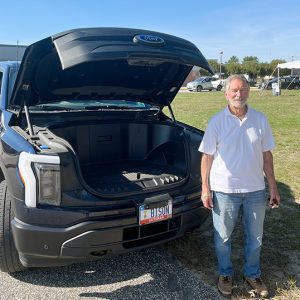
Ted, Ford F-150 Lightning
Ted, Waterford, Ford F-150 Lightning
Ted’s electric truck comes in handy around the farm, for driving across rough terrain but also to power the pressurized fans used in his two greenhouses. He bought it two years ago using the federal tax credit made possible by the Inflation Reduction Act of 2022. Although bison are no longer on the farm, the license plate is a nice homage to the expansive livestock he has kept there.
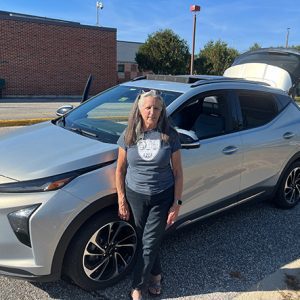
Brenda, Chevy Bolt
Brenda, Norway, Chevy Bolt
A co-owner of the Norway Brewing Company, Brenda is a community staple in Norway and a steadfast advocate for downtown revitalization. She uses public charging often, especially on her trips to Connecticut and Long Island to visit family. She now has all of her favorite charging stops mapped out in her head (with the occasional help of her PlugShare app, of course). Her interest in EVs was first sparked at a Ride and Drive event. When she first purchased her car in 2023, she received a $500 charging gift card, which she still hasn’t used up!
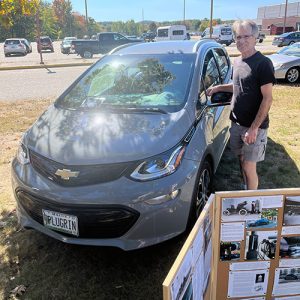
Craig, Chevy Bolt
Craig, Wells, Chevy Bolt EUV
Craig got his most recent EV at a used car dealership and qualified for the $4,000 used EV tax credit under the Inflation Reduction Act. Paired with his 24 rooftop solar panels at home and his 6 home batteries (both of which qualified for tax credits), he’s making the most of an electrified set up. If the power goes out, he can charge off his battery bank until the power is restored, while also using the batteries as a backup home generator. Since he purchased it in 2023, the Bolt has required zero maintenance.
City of Bangor, Ford F-150 Lightning, Hyundai Ioniq 6, Polaris Ranger EV
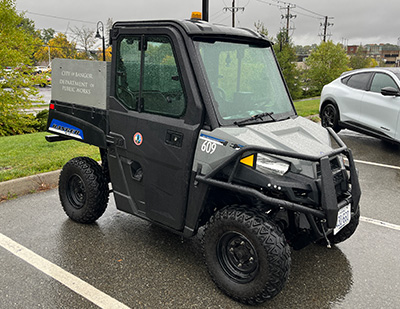
City of Bangor 4-wheeler
The City of Bangor is rapidly electrifying its municipal fleet, boasting a number of models for different use purposes. The Public Works Department was showing off its recent Polaris Ranger EV, an offroad 4-wheeler that can be easily charged from a 120V wall outlet. This smaller vehicle allows for quiet offroad access, rain or shine, as the Public Works team keeps city infrastructure working for Bangor residents.

Zack, Honda Prologue
Zack, Raymond, Honda Prologue
Zack caught the EV bug after test-driving a Chevy Bolt at a previous EV ride and drive event and hasn’t looked back since. He’s leasing his new Honda Prologue in order to qualify for the federal tax credit and commutes half an hour to work both ways without a problem. In fact, he said one of his favorite features is the remote start, which allows him to heat up his car during the winter months in the garage or parking lot before he gets behind the wheel. After doing the math for his home set up, he estimates that the Prologue costs $8-9 to fully charge, a fraction of the cost of a tank of gas.
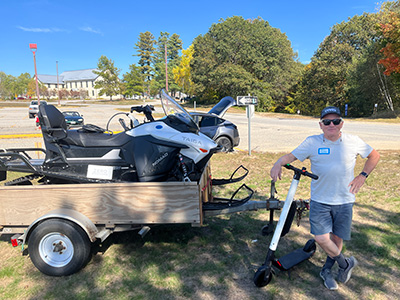
Fred, Taiga Nomad snowmobile
Fred, Norway, Nomad Taiga Snowmobile
Fred is a legend in the Maine EV community, becoming the first EV owner in Maine when he bought a Nissan Leaf in 2012. He’s been all EV ever since. He is most excited about the two most recent electrified additions to his fleet: an electric scooter and an electric snowmobile. The snowmobile logged 300 miles this winter as the primary grooming machine for the Roberts Farm Preserve cross-country ski trails. “Trust me, this thing’s got a lot more pep than the gas ones,” he said with a boyish grin. He’s been showing it off to some local downhill ski mountains in the hope that they’ll make the switch for a zippier, quieter, more cost-effective experience maintaining the slopes.
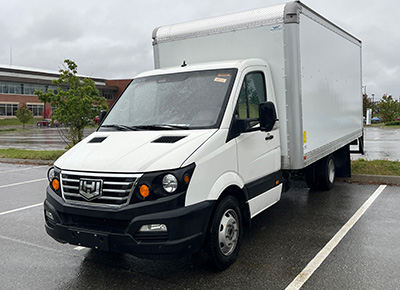
Sun Dog Solar work truck
Sun Dog Solar, Belfast, Workhorse W4CC
Sun Dog Solar, one of the foremost solar installers in Midcoast and Central Maine, recently got two fully electric Class 4 work trucks through an Efficiency Maine program to encourage commercial adoption of medium- and heavy-duty EVs. Their 150-mile range will check all the boxes for local work within the Belfast service region, and the trucks will return home to charge each evening after a day of work. The Sun Dog team recently installed four fast chargers at their new office space, which is going to make their charging quick and easy while also offering charging access to the general public. Their fast chargers are backed up by a battery bank, so solar power can charge the batteries throughout the day, which then provide juice for the fast chargers. This helps them take full advantage of solar power while avoiding demand charges from the on-site fast chargers.
For a closer look at how rural Mainers are using their EVs, check out our visit to John and Erma Evans in Dexter.
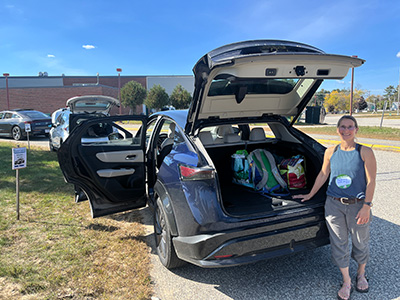
Seal, Nissan Ariya
Seal, Otisfield, Nissan Ariya
Seal’s 5th EV has been a major hit for her and her family, with over 300 miles of range and all-wheel drive for great handling in winter conditions. She got over range anxiety after her first EV, and now she and her family rely on two fully electric vehicles for all their travel needs.
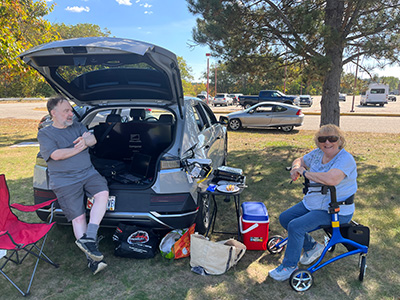
Annette, Ioniq 5
Annette, South Portland, Hyundai Ioniq 5
Annette was cooking hot dogs with an electric grill plugged into her EV as she kindly sat to chat with interested folks passing by. She was first inspired to look into EVs when her local rec center installed EV chargers a few years ago. When she learned about the federal tax credit for EVs, her Ioniq 5 purchase was a no brainer, made all the easier by the recent installation of EV chargers at her apartment building in South Portland. Now, at age 90, Annette can easily charge at home and zip around where she needs to, trading off at the free charger with fellow EV drivers that live in her building.
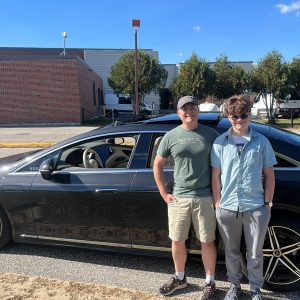
Matt & Wesley, Mercedes EQS
Matt and Wesley, Bowdoinham, Mercedes EQS
Matt has been driving an EV for 12 years and is leasing his most recent edition in order to qualify for the federal tax credit. Matt’s 15-year-old son Wesley is logging all his driving hours on his learning permit in the Mercedes and loving every minute. With more than 500 miles of range, their EV takes the two of them to archery tournaments in Connecticut and back without a single charging stop. Their rooftop solar array at home allows them to charge both of their family EVs nearly for free.
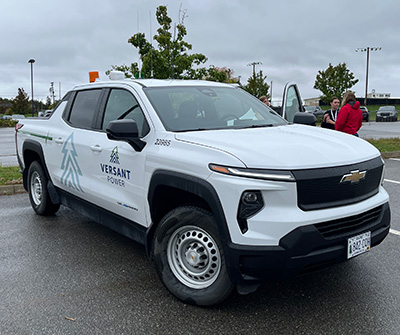
Versant, Chevy Silverado
Versant Power, Penobscot, Aroostook, Washington Counties, Chevy Silverado
Versant Power now has a dozen fully electric Chevy Silverado work trucks to access their large service area in eastern and northern Maine. Each truck boasts 440-480 miles of all-electric range, providing plenty of power to get to Versant ratepayers and power lines in rural areas during storms, power outages, and long workdays.
More about EVs
Pollution from gas-powered cars and trucks makes our air less safe to breathe and fuels climate change, so it’s important that Maine transition to cleaner, healthier ways to get around. NRCM is working with partners across the state to advance healthier, more affordable transportation choices, from electric cars and trucks to more reliable transit and safer walking and biking paths.
Sales of electric cars are booming. July through September 2025 saw several U.S. EV sales records smashed, with full-battery EVs reaching 10% of new vehicle sales for the first time ever. This recent success is in part due to a rush prior to the expiration of federal tax credits for EV purchases on September 30th.
Unfortunately, the efforts by the Trump Administration and their allies in Congress to kill tax credits for clean energy solutions will make it harder for Mainers to choose what is right for them. Worse, the EPA under the Trump administration is planning on repealing tailpipe pollution standards, which, according to their own proposal, will increase gas prices. For those Mainers looking to go electric, Efficiency Maine will still continue providing some incentives. Visit their website to learn more.
Here at NRCM we won’t stop fighting for a brighter future for everyone in our rural state, so they have healthier, more reliable and affordable ways to get around.
—Josh Caldwell, NRCM Climate & Clean Energy Policy Advocate and Outreach Manager














Leave a Reply